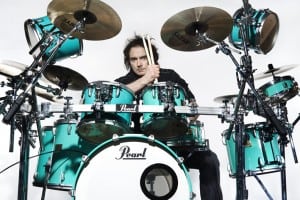Virgil Donati has been playing the drums since he was 2-years-old in Australia. Since he became a professional drummer in his teens his career skyrocketed, recording and touring with legends such as Mick Jagger, Planet X, CAB and many other credited artists. He plays a range of musical styles from jazz and fusion to progressive metal. Donati will be kicking off his own “In This Life” US tour with two LA shows at The Baked Potato on July 12 and Alva’s Showroom in San Pedro July 13.
Donati came from a musical family and as a toddler loved to watch his father’s band practice in their home in Melbourne. As he grew up, he started experimenting with his own bands and musical styles.
He recently released his third solo album “In This Life,” which was composed and orchestrated by himself, on his tour he will be playing songs off of his solo album and pieces he’s done with other bands he’s worked with.
Some of Donati’s most commercially noted work was when he played with Southern Sons and Loose Change, and has been in demand by a lot of artists for his astonishing and cutting-edge drumming skills. OC Concert Guide recently caught up with Donati and talked to him about his influences growing up and upcoming tour.
OCCG: Who were some of the biggest influences in music when you first started playing the drums?
Virgil: First and foremost, I would have to credit my parents. They were musicians and even as a toddler, I always wanted to be present at all their band rehearsals. My father’s record collection was responsible for my early drum influences. Included were big band records such as Count Basie, Buddy Rich, lot’s of Brazilian artists, Jobim, Sergio Mendes, and others.
OCCG: Did you and do you now play any other instruments? What other instruments would you like to play other than the drums?
Virgil: Yes, my father also wanted me to play piano, so aside from drumming, I was given piano lessons from the age of 6. It has proven to be indispensable part of my musical expression.
OCCG: When did you realize you wanted to play progressive rock and fusion? Was it an album or another player that turned you onto the genre?
Virgil: As a teenager in the 70’s, I was in awe of the great players and bands of the fusion movement. I think the turning point for me was Billy Cobham’s Spectrum record, along with anything by Chick Corea and Mahvishnu Orchestra.
OCCG: Why do you think the rhythm and drums play such a strong role in progressive music?
Virgil: I believe it’s because rhythm is the fundamental difference between pop/rock music, and fusion/progressive music. It’s the rhythmic interplay between musicians, the rhythmic inventiveness of the music, which is free of the restrictions of commercial music. Rhythm is a wondrous thing, and warrants expressiveness.
OCCG: Who have you played with that impacted your playing or pushed you further as a drummer?
Virgil: I’ve been privileged to play with some of the greatest players on the planet throughout my career, and each situation contributes to further growth and maturity as a player. I always try to bring 110% to any gig, and also in my preparation for a gig or tour. That in itself contributes to growth, and also the incentive for striving harder is supported by being occupied.
OCCG: Do you feel like you’ve mastered your instrument? What are some of your struggles as a musician?
Virgil: I don’t know if a true artist can ever feel mastery over one’s art. I think I have finally reached a state where I feel a pleasing sense of control over the sounds and rhythms I can produce while performing, but at the same time, I find myself constantly challenging those feelings by consciously placing myself on the edge of that control, in the quest to keep moving forward.
OCCG: What are some difference when you front a project with your own music as a drummer that is different than when you are playing another musician’s music?
Virgil: With the exception of perhaps a few occasions, the differences are negligible. After all, it is all music, and must be played accordingly. I bring my interpretation to another’s music, as I would to mine, and I suppose that’s what I’m hired for. I’m sure it’s the same for a guitarist, bass player and keyboard player. You play the music. You listen, you interpret, you use your judgment and taste to the best of your ability. You need to be objective.
OCCG: Tell us about the players who are joining you on this tour?
Virgil: I’m amazed by the virtuosity displayed by so many of the younger players out there now. I’m always on the lookout for new talent, and I get a lot of satisfaction in featuring some of them not only on my record, but also on this tour. Anthony Crawford (bass), Isamu McGregor (keys), and André Nieri (guitar) are remarkable musicians. The music we’re playing is demanding, and they bring such flair and grace to the performance that I think audiences will be overwhelmed.
OCCG: What can fans expect to hear on this tour?
Virgil: We will be playing most of the tracks from ‘In This Life’ and also a few Planet X tracks. As a surprise, we will play some Allan Holdsworth covers. Given that Anthony and I have both toured with Allan, and given that I find his music sublime and exalting, we decided to include four tracks of his, including a few that Allan hasn’t performed live in years. I’m convinced that it’s going to be a breathtaking experience for the audience.
